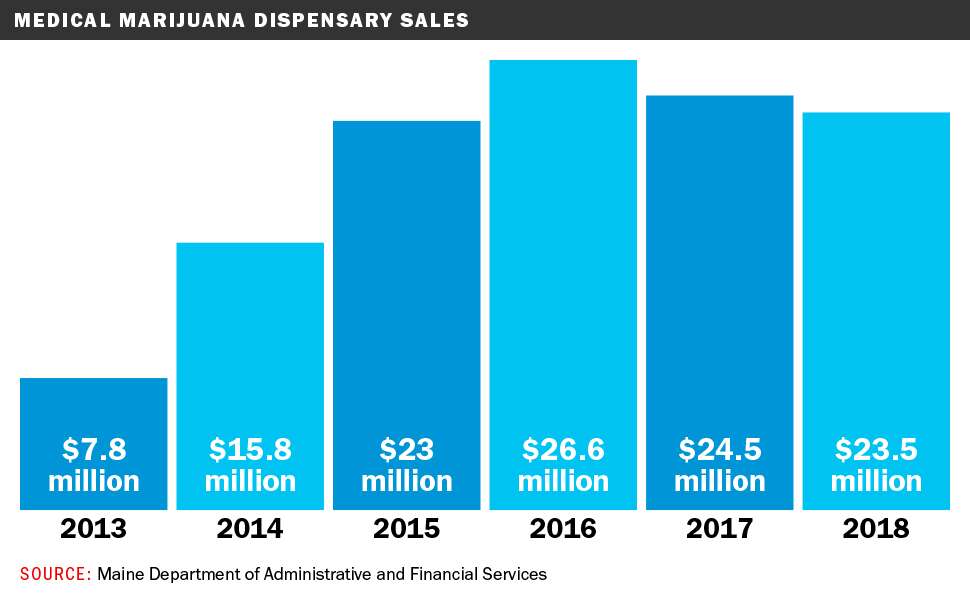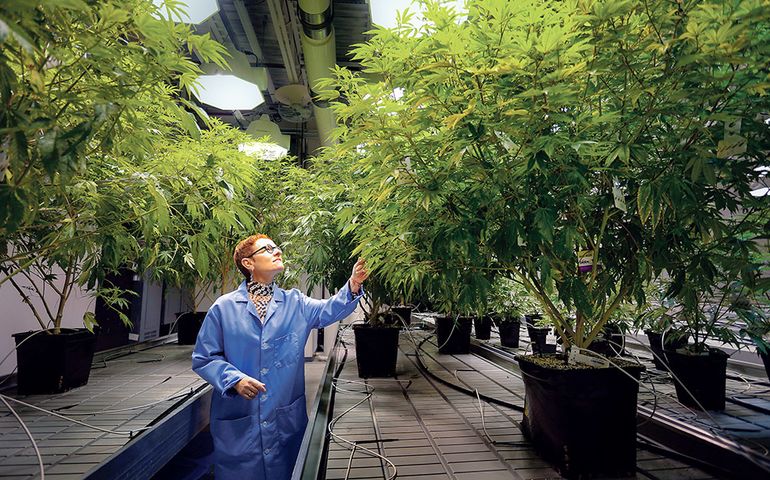
Maine’s marijuana dilemma: ‘Cannabiz’ poised to grow, but in a holding pattern
 Photo / Tim Greenway
Patricia Rosi, CEO of Wellness Connection of Maine, operates four of the state’s eight dispensaries. Last year state-licensed dispensaries had sales of $23.5 million.
Photo / Tim Greenway
Patricia Rosi, CEO of Wellness Connection of Maine, operates four of the state’s eight dispensaries. Last year state-licensed dispensaries had sales of $23.5 million.
Twenty-five years ago, Maine’s marijuana proprietors were more likely to be named in a local police blotter than the pages of Mainebiz.
But today, Patricia Rosi, CEO of Wellness Connection of Maine, proudly talks about her company’s business in medical-use cannabis, which Maine legalized in 1999. “This is a booming industry,” she says.
Wellness Connection launched in 2010, one year after the Legislature created a system of licensed dispensaries to serve the medical cannabis market. Today, Wellness Connection operates four of the state’s eight dispensaries, which in 2018 rang up sales totaling $23.5 million, according to state data. That’s a 40% increase over 2014 sales, and triple the 2013 total.

However, sales in 2018 were also down 13% from their peak of $26.6 million in 2016. The number of caregivers — licensed individuals who provide medical cannabis – has also shrunk to about 3,000, 9% less than the number in 2016.
Not coincidentally, 2016 was also when a citizen’s referendum allowed Maine adults to grow, own and use marijuana without demonstrating a medical need for it. Enthusiasm for the potential of pot seemed to reach a new high.
Since then, efforts to implement rules governing the business of recreational-use marijuana have stalled. Due to legislative delays, a 2017 veto by then-Gov. Paul LePage, and in January, the state’s decision to change consultants for developing the regulations, Maine has no legal market for recreational cannabis, more than two years after it became legal.
That lack has also affected the medical market. With marijuana legal, customers have begun growing their own “medicine” or seeking it elsewhere, according to Rosi. Meanwhile, dispensaries and caregivers — some of whom hope to expand into the recreational business — are being forced to cut prices. And wait.
“We’re in a state of limbo,” says Rosi. “This is the equivalent of saying ‘let’s legalize gasoline,’ but not having any gas stations.”
David Boyer, Maine political director for the Marijuana Policy Project, shares that frustration.
“We knew this would take a long time,” he says, “but it’s disappointing for Maine to be last among the states that passed laws in 2016.”
In addition to the Maine referendum, voters in California, Massachusetts and Nevada approved recreational marijuana that year. A total of eight states and the District of Columbia now have such laws, and medical cannabis is permitted in 28 states, including all of the Northeast.
More than a dozen licensed stores sell pot for general adult use in Massachusetts.
“Mainers are working in the Massachusetts cannabis industry rather than Maine’s,” Boyer says. “I imagine they’d rather be here.”
Still, Boyer and Rosi remain optimistic about the future of Maine’s industry, which has been estimated to hold the potential for $325 million in annual sales.
Since the start of Gov. Janet Mills’ administration in January, Rosi says, “there’s a momentum we haven’t seen in a while.”
Despite confusion over the changing consultants, the administration has created an Office of Marijuana Policy to manage the recreational market. Rosi believes that could happen by early 2020.
With 80 employees and dispensaries in Bath, Brewer, Gardiner and Portland, Wellness Connection is poised to enter the market. But don’t expect any dramatic changes in the way the company does business, says Rosi.
“We view this as a chance to broaden access. Society tends to consider (medical and recreational) cannabis users as two distinct populations, but there’s really a spectrum of consumers,” she says. “For us, it’s about improving the quality of life, and we’re not going to change that.”
Boyer, who has been hosting cannabis industry mixers in Portland for the past several months, is especially bullish on the opportunities for small business and with the tourist market.
“With the way the law is set up, and the way Maine is perceived, the cannabis industry lends itself to our small businesses,” he says. “This is a special moment in time, when we Mainers have a chance to create a new, legal industry from the ground up.”










0 Comments